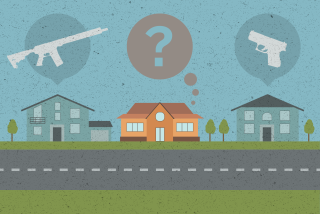Violence
- Share via
Augustine Cruz warned his son Josh, 15, that the gangs at Lennox Middle School were dangerous--that he could be killed or wounded and his future ruined. Josh said, “I wasn’t listening. I was thinking my dad was giving me a lecture because he didn’t trust me. I thought gangs were cool. If I had a problem, they’d back me up.”
But three months after he was jumped into gang, he wanted out. Gang members took acid and smoked marijuana. His sister Miriam told him she was afraid she might get killed in a retaliation shooting. His father and mother got help from a counselor at school, and together they helped Josh come to his own decision to get jumped out--which led, as they expected, to a more severe beating than the original initiation.
“It hurt my heart,” said Augustine, a bookkeeper who moved here from Mexico City. “But it was the only solution.”
Josh still maintains that parents should not lecture their children. But, he says, “If it wasn’t for my dad and my mom, I’d probably still be in there.”
According to the Justice Department, the arrest rate for youths 10 to 17 for violent crimes doubled from 1983 to 1992; but the arrest rate for teenagers accused of violent crimes declined in 1995 for the first time since 1987. Every day on average, 10 children under 18 in the U.S. are killed by handguns and many more are wounded. Being safe from violence is the single topic kids want to talk about more, according to the national poll released Wednesday.
Experts said parents can ask schools to offer conflict resolution courses or peer mediation programs. They can also form alliances with other parents--getting to know the parents of their children’s friends and negotiating what they can do or watch on TV in each other’s homes.
It may be awkward, but experts also urged parents to ask other parents and caregivers whether there is a gun in their home.
Because children imitate parents, parents also need to control their own behavior and try to cool off before disciplining a misbehaving youngster.
Parents can help children channel their natural anger and aggression into rigorous play, such as a soccer game or a pillow fight. They should make it clear that hitting and screaming aren’t permitted and encourage peaceful ways to settle problems.
Parents who live in areas where gangs are prevalent can assure children that many adults are working to stop it, suggests the new parents’ guide being made available this week in conjunction with the poll. They can say, “That’s why we don’t let you go out alone at night and why we always want to know where you are and who you’re with. And there are lots of other people, like the police, whose job it is to make sure that children like you stay safe.”
More to Read
Sign up for Essential California
The most important California stories and recommendations in your inbox every morning.
You may occasionally receive promotional content from the Los Angeles Times.













